Twin Mirror Review
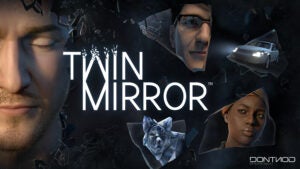

Twin Mirror marks the first self-published title from DONTNOD, the critically acclaimed studio behind the beloved Life is Strange franchise.
DONTNOD has had quite a run as of late. After the near-perfect Life is Strange 2 reached its epic conclusion before the arrival 2020, the developer broke new ground with Tell Me Why, a three-part family drama that put a transgender character in the limelight.
Now, it’s back yet again with its first-ever self-published experience, which for any developer is a huge achievement. My hope with Twin Mirror was that it would showcase the studio’s full potential as one of this medium’s pioneers when it comes to narrative-driven interactive experiences, and while I enjoyed my time Twin Mirror, it saddens me to say that it also left me feeling disappointed – but let’s back things up for a moment.
In Twin Mirror, players step into the shoes of Sam Higgs, an ex-investigative journalist who has clearly been burned by the events of his past, now living in a state of emotional disconnect from the people who were once closest to him. Sam’s story picks up as he returns to his small American hometown of Basswood, where the sudden death of an old friend forces him to confront everything he tried to forget.
Related: Best PS4 Games
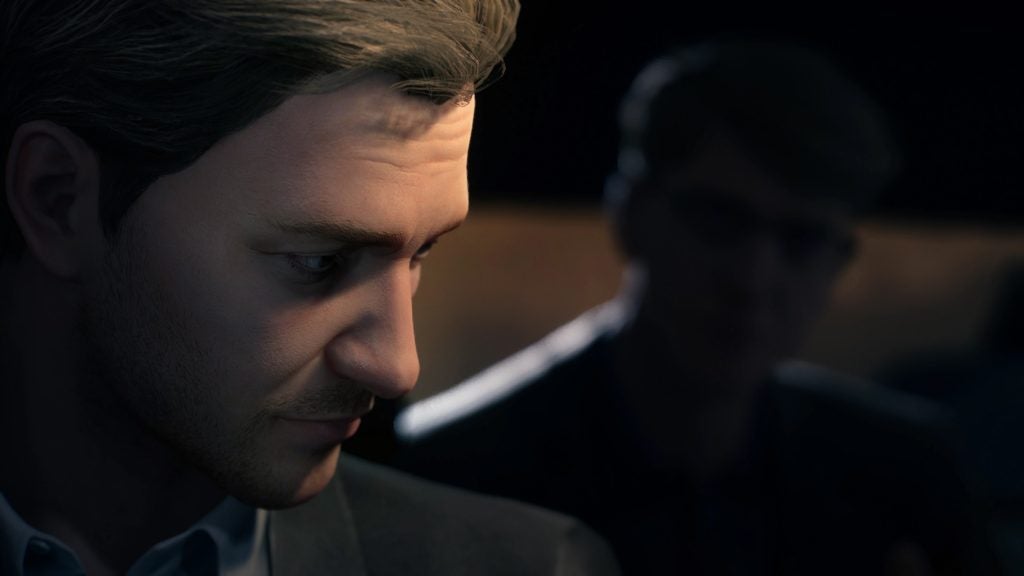
Things take a strange turn when the young daughter of the recently deceased seems to suspect foul play, begging Sam to take her claims seriously and investigate the death for himself. Before long, Sam’s plan to have a fleeting visit turns into a much deeper affair, as the hidden underbelly of Basswood begins to reveal itself, showing just how much has changed in the time since Sam’s been away.
With Sam and the key residents of Basswood being a fair bit older than the leading characters in Life is Strange, the narrative feels far more mature. Complex themes are explored such as unemployment, drug abuse and the unpredictable perils of adult relationships.
Many of these themes are secondary to the game’s central conceit: facts versus feelings. I’m aware of the modern political connotations associated with that phrase, but in the case of Twin Mirror, it relates specifically to Sam’s old profession and how a journalist’s quest for truth can often have unintended, real-world consequences.
For example, Sam’s magnum opus was an article denouncing the horrendous working conditions found at Basswood’s mines. While undoubtedly a noble endeavour, Sam’s investigation resulted in the closure of the mines and mass unemployment in Basswood – a fact that is constantly thrown at him by the town’s ex-miners.
Related: Cyberpunk 2077
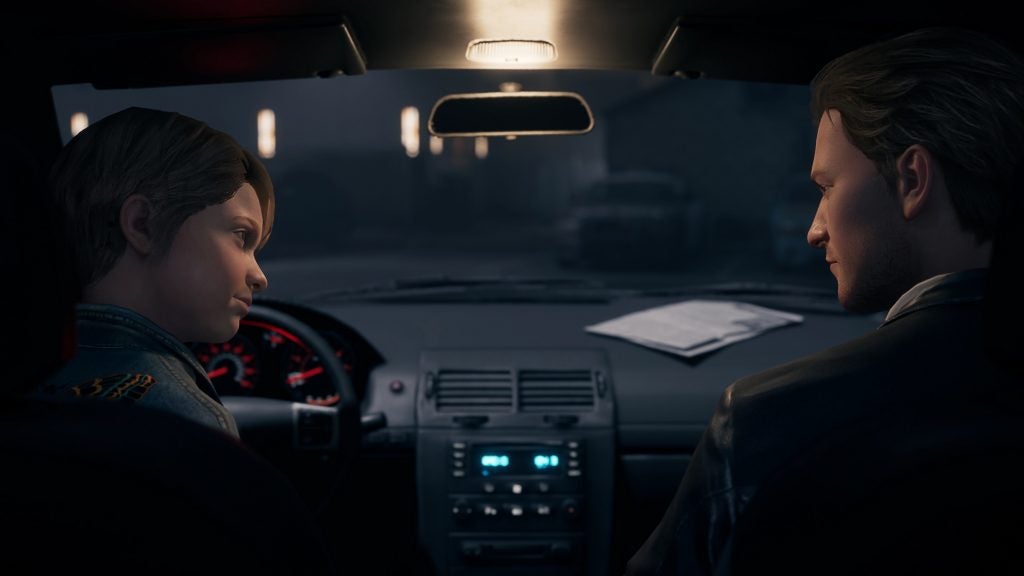
Having been burned once before, Sam must now consider the options at hand. Investigate further into the death of his friend, potentially putting old acquaintances in harm’s way in a bid for the truth, or try and be there on an emotional level for those who are grieving, leading them away from danger throughout the adventure.
To offer some help in this regard, Sam’s psyche turns out to be a multifaceted arsenal, with two hidden superpowers: The Double and the Mind Palace. The Double is a well-dressed manifestation of Sam’s empathetic attributes that only Sam can see. His presence allows for some entertaining back and forth as the consequences of an impending action are weighed up in real time.
Alternatively, serving to indulge Sam’s analytical side is the Mind Palace (consider Superman’s Fortress of Solitude and you’re not far off) – a gorgeous visualization of the inner workings of Sam’s mind where time stands still.
Diving into the Mind Palace, Sam is able to view memories with pinpoint precision and even evaluate a crime scene by scanning various clues in the environment. It’s a handy tool but above all else it’s incredible to look at, with bright, clear visuals that contrast the muted and murky colour palette featured in Basswood.
Related: PS5 vs Xbox Series X
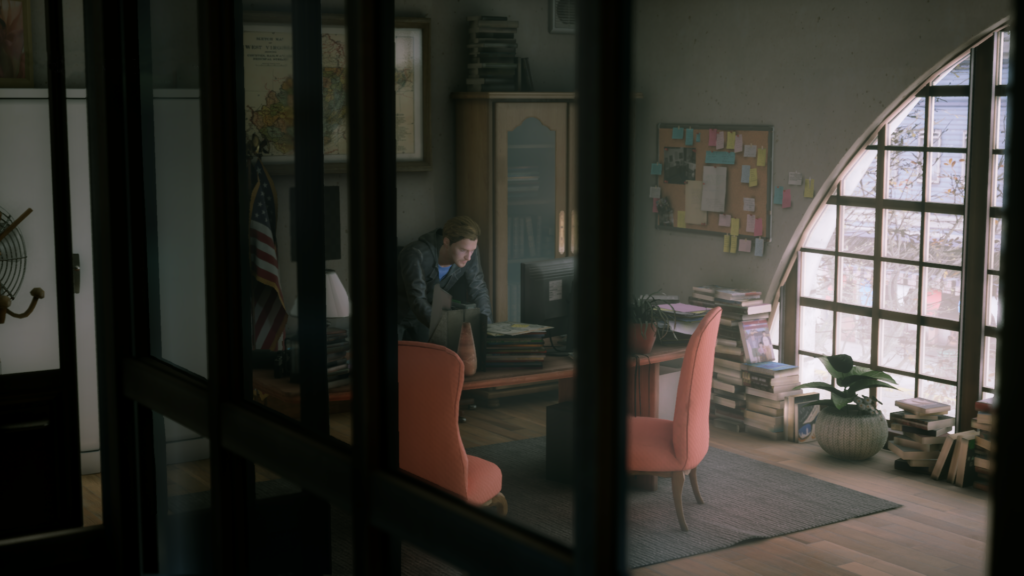
The Mind Palace can flip on a dime however, as its appearance is directly linked to Sam’s emotions. If he’s in panic, the Palace becomes more of a mental prison, as Sam’s anxiety tries to keep him in a state of confusion. These moments are particularly exciting as it reminds the player that the Mind Palace can’t be relied on consistently as a refuge from everything that’s happening around them.
It’s such a shame then that with these unique mechanics, and after establishing an interesting cast of characters, Twin Mirror is over before you know it. Unlike DONTNOD’s previous titles, Twin Mirror is not an episodic adventure, with the entire game available right from the start.
With that in mind, I still assumed that Twin Mirror would more or less stack up with the same length of those earlier experiences, when in fact it’s a lot shorter than any of them. At roughly six hours, it’s only slightly longer than the average time it takes to complete just over two episodes of Life is Strange.
Opting for a shorter game isn’t in itself problematic, but it is when Twin Mirror still acts as if you’ve been playing the game for about a dozen hours and dissecting it as you would in the usual breaks between episodes. The issue is that the narrative’s major twists and plot points don’t land with the same impact that they’re clearly expecting.
Related: Nintendo Switch Pro
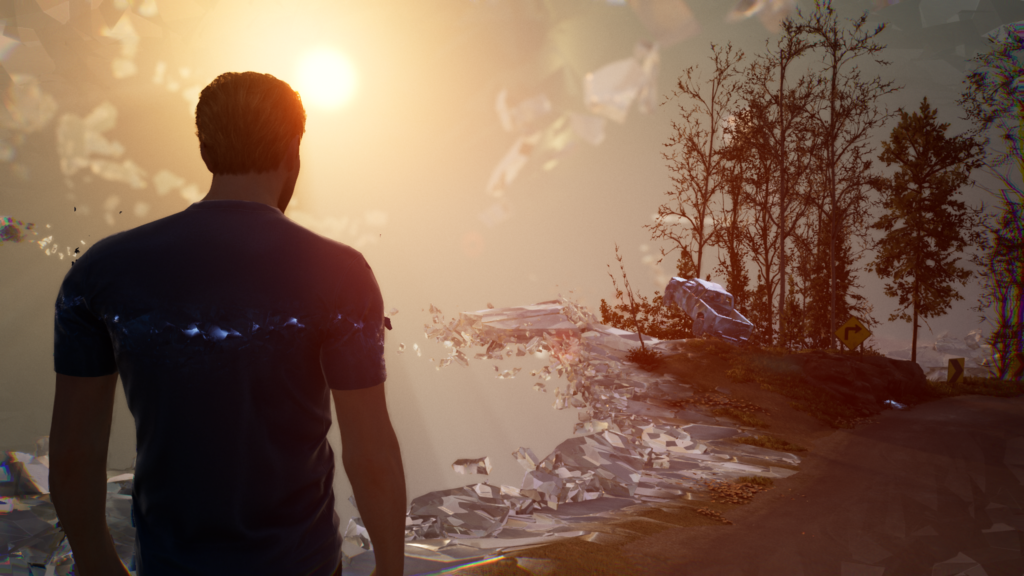
Without spoiling too much, the most obvious example of this comes just before the climax, where the player has to make a definitive decision to go forth with the intent of finding the truth above all costs, or prioritising the safety of Sam and those closest to him.
The decision is preceded by some character building for The Double himself, but my relatively short time with the character prevented me from connecting with the emotional stakes (and this is coming from someone who cried like a baby when playing Life is Strange).
Compared to the multi-state road trip of Sean and Daniel in Life is Strange 2, Twin Mirror doesn’t give the audience nearly enough time to warm to its cast of characters, and I wonder if the game might have fared better if it simply introduced fewer characters into the mix to spend more time with the one’s that actually matter.
It’s worth pointing out that I also encountered a few glitches along the way and while none of them were game-breaking, they did offer mild-frustration such as when a button prompt simply refused to appear.
Verdict – Should you buy Twin Mirror?
It’s a testament to how much I enjoy DONTNOD’s storytelling and world-building that my main gripe with Twin Mirror is that there isn’t more of it.
It establishes an engaging premise that had me eager to dive into a juicy mystery, alongside several inspired mechanics that could have set it on the path to greatness, but it’s all over so quickly that it never fully delivers on the promise of an unforgettable narrative.
Twin Mirror is still a lot of fun to play, and the various endings invite the player to return more than once, but don’t expect it to have the same emotional resonance as Life is Strange or Tell Me Why.
The post Twin Mirror Review appeared first on Trusted Reviews.
Source Trusted Reviews

No comments